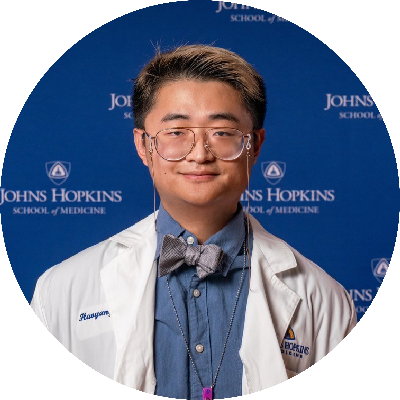
Haoyang Mi
My research projects focus on the quantitative characterization of the tumor microenvironment (TME) to better understand the mechanism of cancer progression and anti- tumor immunity. Specifically, I am fascinated by the crosstalk of different cell populations within the TME in the spatial domain. Using multiplexed tissue imaging and image processing techniques, I was able to distinguish single-cell identities and their spatial locations from pathological samples of various cancer types. Using a combination of spatial statistics and machine learning, I was able to distill key spatial features that can be used to predict cancer patients’ likelihood of response to therapy and survival term. For example, my approaches revealed that the proximity of a rare subtype of myeloid — CD163- Arginase+ macrophage — to helper T cell favors improved anti-tumor immunity in hepatocellular carcinoma. Remarkably, the immunosuppressive role of myeloid cells was also observed in pancreatic cancer and non-small cell lung cancer. These findings suggest novel therapeutic candidates in immune-oncology research may benefit the design of future clinical trials and facilitate precision medicine. I conducted my research in Aleksander Popel’s lab. Our lab is devoted to applying systems biology approaches to solve problems related to cancer and ocular and cardiovascular diseases.
Questions & Answers
Why did you choose Johns Hopkins for your work?
I chose Johns Hopkins for its multidisciplinary community of biomedical research and the close relationship to clinical care. This diverse environment encourages me to keep open minded and pursue novel ideas.
What does receiving this award mean to you personally and professionally? Do you have any connection with the particular award you received?
I have always looked up to past award winners. I followed Chen Zhao’s footprint — one of our lab’s recent alumni, who won the Bao Gyo Jung Research Award in 2020 — to dive deep and pursue serious science. It is a great honor to receive this award, and I consider it a very encouraging acknowledgement of my work. It also motivates me to continue my research in the field of digital pathology.
What contributed to your project’s success?
I owe most of my achievements to my incredible mentor, Aleksander Popel, who provided support and understanding over these years. He inspired me with his unique perspective gained from rich experience as a cancer researcher and engineer. Dr. Popel has been a role model for me. His dedication to science motivates me to pursue my career seriously. In addition, I am fortunate to work with many prominent researchers within and outside of Johns Hopkins, including Dr. Elizabeth Jaffee, Dr. Lisa Coussens from Oregon Health and Science University and Dr. Tricia Cottrell from Queen’s University. Their guidance is invaluable to me. Finally, I would like to thank my family for their unconditional support throughout my academic journey, which has been crucial to my success.
What thoughts do you have about Young Investigators’ Day itself, as a celebration of the roles student and fellows play in research at Johns Hopkins?
I think the program provides a great platform for students and fellows to showcase their research. The biomedical research community at Johns Hopkins has become stronger and larger each year, and Young Investigators’ Day offers an opportunity for members to be aware of current frontiers and new achievements.
What has been your best/most memorable experience while at Johns Hopkins?
The white coat ceremony was my most memorable experience at Hopkins. I felt so honored the moment I wore the coat and took the oath with my cohort, and I was so proud that I was officially among those who fight for human lives with our knowledge and devotion.
What are your plans over the next year or so?
I am planning to finish my Ph.D. in the next two years. After that, I envision myself working as a research scientist at pharmaceutical companies in the field of digital pathology to promote new drug discovery and development.
Tell me something interesting about yourself that makes you unique. Do you have any special hobbies, interests or life experiences?
Just as I enjoy exploring the sophisticated environment of human cancer, I am also obsessed with the mystery of the universe. I am an astrophotographer — that is, I bring the beauty of stars, planets and nebulae, which are invisible to human eyes, to life with my telescopes and cameras.